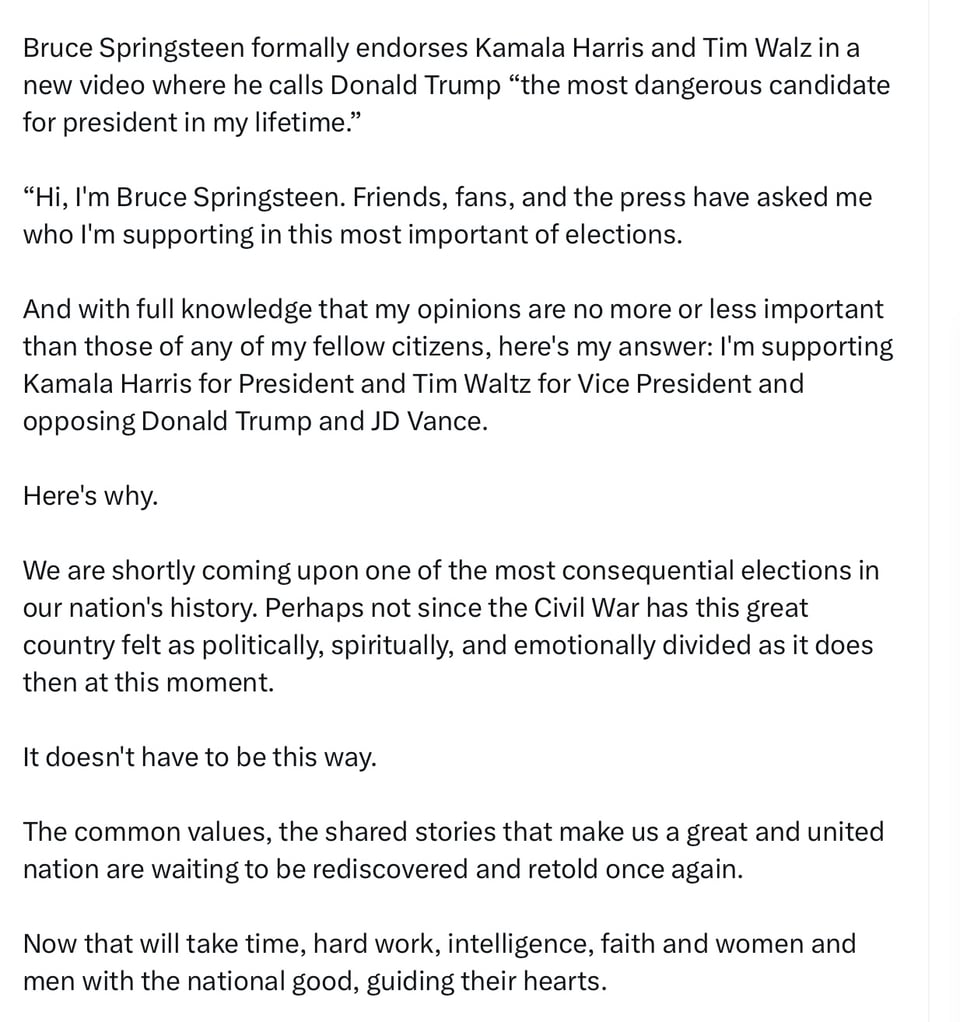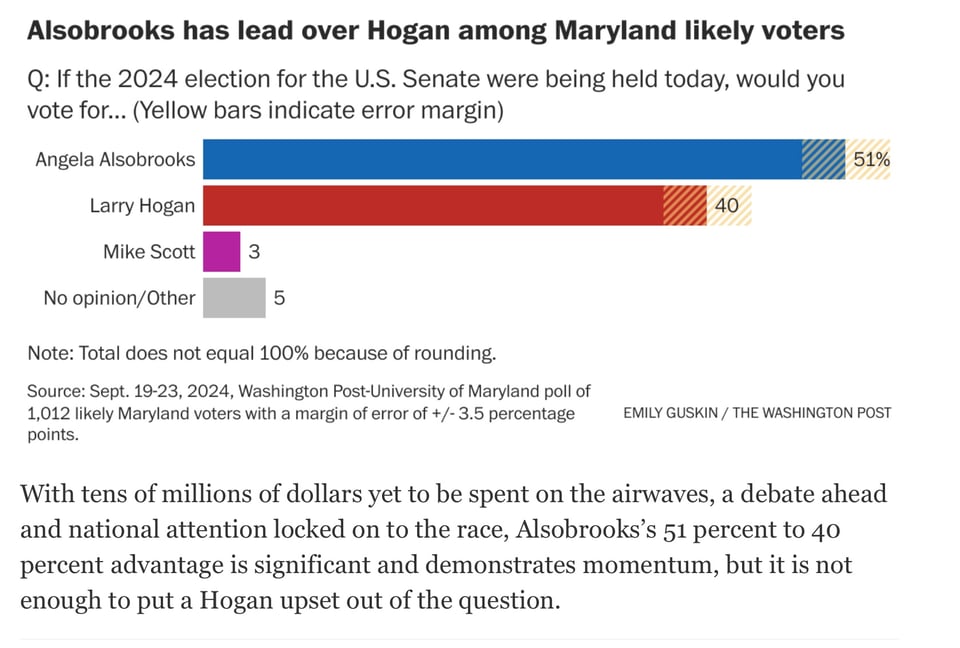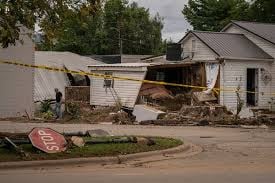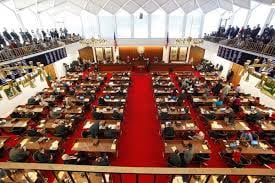Friday, October 4, 2024. Annette’s News Roundup.
Thank you, Liz Cheney.

Liz Cheney: "In this election, putting patriotism ahead of partisanship is not an aspiration. It is our duty."
“When our time of testing came, they will say of us, we loved our country more.”
In Ripon, Wisconsin, where the Republican Party was founded in 1854, former Republican Congresswoman Liz Cheney endorsed Democratic Vice President Harris for President of the United States.
The Vice President then spoke - 22:00 to 39.00.
Cheney: “I ask all of you here and everyone listening across this great country to join us...To reject the depraved cruelty of Donald Trump and I ask you instead to help us elect Kamala Harris for president."
— Republicans against Trump (@RpsAgainstTrump) October 3, 2024
pic.twitter.com/NM3hnZupv8
More will happen too.

(CNN) — Former House GOP conference chair Liz Cheney and former Trump White House aides Alyssa Farah Griffin, Cassidy Hutchinson and Sarah Matthews will make the case against the reelection of former President Donald Trump in a fireside chat in Montgomery County, Pennsylvania, next week, CNN has exclusively learned.
Thank you, Bruce, too.
NEW
— Yashar Ali 🐘 (@yashar) October 3, 2024
Bruce Springsteen formally endorses Kamala Harris and Tim Walz in a new video where he calls Donald Trump “the most dangerous candidate for president in my lifetime.”
“Hi, I'm Bruce Springsteen. Friends, fans, and the press have asked me who I'm supporting in this most… pic.twitter.com/JiZ9d9ejkf


Thank you, Cassidy Hutchinson as well.
BREAKING: In a stunning announcement, Donald Trump’s former White House aide, Cassidy Hutchinson, just announced she is endorsing Kamala Harris. Retweet to make sure all Americans see this and know those closest to Trump don’t trust him. pic.twitter.com/JOFYKf80FL
— Kamala’s Wins (@harris_wins) October 3, 2024
Time is running out.
Do everything you can to encourage voter registrations.
Share this! Make calls! Write Postcards! Knock on doors! Who do you know in which state!
When is the voter registration deadline in my state?
(NEXSTAR) – The 2024 presidential election is fast approaching, and in some states, the voter registration deadline is as soon as this week.
Voters in key battlegrounds, including Florida, Arizona, and Georgia, have just days to register, and missing these deadlines could mean losing the opportunity to cast a ballot in what is shaping up to be a pivotal election.
In states like Alaska and Rhode Island, voter registration must be completed by Sunday, Oct. 6. Similarly, South Carolina has an Oct. 6 deadline for online registration, while the in-person registration deadline is earlier, on Oct. 4.
Looking further ahead, several states will see their voter registration deadlines fall on Monday, Oct. 7. These include important swing states such as Arizona, Florida, and Georgia, along with other states like Indiana, Kentucky, and Montana.
Some states, like Connecticut and California, allow in-person registration up to Election Day, but many others cut off all forms of registration weeks in advance. For example, in Alabama, Pennsylvania, and Colorado, voters must register by mid-to-late October.
Below is a full state-by-state breakdown of voter registration deadlines:
Alabama
Deadline to register by mail: Must be postmarked by Oct. 21
Deadline to register in person: Oct. 21
Deadline to register online: Oct. 21
Alaska
Deadline to register by mail: Must be postmarked by Oct. 6
Deadline to register in person: Oct. 6
Deadline to register online: Oct. 6
Arizona
Deadline to register by mail: Must be postmarked by Oct. 7
Deadline to register in person: Oct. 7
Deadline to register online: Oct. 7
Arkansas
Deadline to register by mail: Must be postmarked by Oct. 7
Deadline to register in person: Oct. 7
Deadline to register online: Not available
California
Deadline to register by mail: Must be postmarked by Oct. 21
Deadline to register in person: Nov. 5
Deadline to register online: Oct. 21
Colorado
Deadline to register by mail: Must be postmarked by Oct. 28
Deadline to register in person: Nov. 5
Deadline to register online: Oct. 28
Connecticut
Deadline to register by mail: Must be postmarked by Oct. 18
Deadline to register in person: Nov. 5
Deadline to register online: Oct. 18
Delaware
Deadline to register by mail: Must be postmarked by Oct. 12
Deadline to register in person: Oct. 12
Deadline to register online: Oct. 12
District of Columbia
Deadline to register by mail: Must be received by Oct. 15
Deadline to register in person: Nov. 5
Deadline to register online: Oct. 15
Florida
Deadline to register by mail: Must be postmarked by Oct. 7
Deadline to register in person: Oct. 7
Deadline to register online: Oct. 7
Georgia
Deadline to register by mail: Must be postmarked by Oct. 7
Deadline to register in person: Oct. 7
Deadline to register online: Oct. 7
Hawaii
Deadline to register by mail: Must be postmarked by Oct. 28
Deadline to register in person: Nov. 5
Deadline to register online: Nov. 5
Idaho
Deadline to register by mail: Must be postmarked Oct. 11
Deadline to register in person: Nov. 5
Deadline to register online: Oct. 11
Illinois
Deadline to register by mail: Must be postmarked Oct. 8
Deadline to register in person: Nov. 5
Deadline to register online: Oct. 21
Indiana
Deadline to register by mail: Oct. 7
Deadline to register in person: Oct. 7
Deadline to register online: Oct. 7
Iowa
Deadline to register by mail: Oct. 21
Deadline to register in person: Nov. 5
Deadline to register online: Oct. 21
Kansas
Deadline to register by mail: Must be postmarked by Oct. 15
Deadline to register in person: Oct. 15
Deadline to register online: Oct. 15
Kentucky
Deadline to register by mail: Must be postmarked by Oct. 7
Deadline to register in person: Oct. 7
Deadline to register online: Oct. 7
Louisiana
Deadline to register by mail: Oct. 7
Deadline to register in person: Oct. 7
Deadline to register online: Oct. 15
Maine
Deadline to register by mail: Must be received by Oct. 15
Deadline to register in person: Oct. 15
Deadline to register online: Nov. 5
Maryland
Deadline to register by mail: Must be postmarked Oct. 15
Deadline to register in person: Nov. 5
Deadline to register online: Oct. 15
Massachusetts
Deadline to register by mail: Must be postmarked Oct. 26
Deadline to register in person: Oct. 26
Deadline to register online: Oct. 26
Michigan
Deadline to register by mail: Must be postmarked Oct. 21
Deadline to register in person: Nov. 5
Deadline to register online: Oct. 21
Minnesota
Deadline to register by mail: Oct. 15
Deadline to register in person: Oct. 15
Deadline to register online: Oct. 15
Mississippi
Deadline to register by mail: Must be received by Oct. 15
Deadline to register in person: Nov. 5
Deadline to register online: Oct. 15
Missouri
Deadline to register by mail: Must be postmarked by Oct. 9
Deadline to register in person: Oct. 9
Deadline to register online: Oct. 9
Montana
Deadline to register by mail: Must be postmarked by Oct. 7
Deadline to register in person: Nov. 5
Deadline to register online: Not available
Nebraska
Deadline to register by mail: Must be postmarked by Oct. 18
Deadline to register in person: Oct. 25
Deadline to register online: Oct. 18
Nevada
Deadline to register by mail: Must be postmarked by Oct. 8
Deadline to register in person: Nov. 5
Deadline to register online: Oct. 23
New Hampshire
Deadline to register by mail: Must be received by Nov. 5
Deadline to register in person: Nov. 5
Deadline to register online: Not available
New Jersey
Deadline to register by mail: Must be postmarked by Oct. 15
Deadline to register in person: Oct. 15
Deadline to register online: Oct. 15
New Mexico
Deadline to register by mail: Must be postmarked by Oct. 8
Deadline to register in person: Nov. 5
Deadline to register online: Oct. 8
New York
Deadline to register by mail: Must be postmarked Oct. 26
Deadline to register in person: Oct. 26
Deadline to register online: Oct. 26
North Carolina
Deadline to register by mail: Must be postmarked by Oct. 11
Deadline to register in person: Allowed during early voting period (Oct. 17 – Nov. 2)
Deadline to register online: Oct. 11
North Dakota
Voter registration is not required in North Dakota, but you will need a valid form of ID. Click here to learn more.
Ohio
Deadline to register by mail: Must be postmarked by Oct. 7
Deadline to register in person: Oct. 7
Deadline to register online: Oct. 7
Oklahoma
Deadline to register by mail: Must be postmarked by Oct. 11
Deadline to register in person: Oct. 11
Deadline to register online: Oct. 11
Oregon
Deadline to register by mail: Must be postmarked by Oct. 15
Deadline to register in person: Oct. 15
Deadline to register online: Oct. 15
Pennsylvania
Deadline to register by mail: Must be received by Oct. 21
Deadline to register in person: Oct. 21
Deadline to register online: Oct. 21
Rhode Island
Deadline to register by mail: Must be postmarked by Oct. 6
Deadline to register in person: Oct. 6
Deadline to register online: Oct. 6
South Carolina
Deadline to register by mail: Must be postmarked by Oct. 7
Deadline to register in person: Oct. 4
Deadline to register online: Oct. 6
South Dakota
Deadline to register by mail: Must be received by Oct. 21
Deadline to register in person: Oct. 21
Deadline to register online: Not available
Tennessee
Deadline to register by mail: Must be postmarked by Oct. 7
Deadline to register in person: Oct. 7
Deadline to register online: Oct. 7
Texas
Deadline to register by mail: Must be postmarked by Oct. 7
Deadline to register in person: Oct. 7
Deadline to register online: Not available
Utah
Deadline to register by mail: Must be received by Oct. 25
Deadline to register in person: Nov. 5
Deadline to register online: Oct. 25
Vermont
Deadline to register by mail: Must be received by Nov. 5
Deadline to register in person: Nov. 5
Deadline to register online: Nov. 5
Virginia
Deadline to register by mail: Must be postmarked by Oct. 15
Deadline to register in person: Nov. 5
Deadline to register online: Oct. 15
Washington
Deadline to register by mail: Must be received by Oct. 28
Deadline to register in person: Nov. 5
Deadline to register online: Oct. 28
West Virginia
Deadline to register by mail: Must be postmarked by Oct. 15
Deadline to register in person: Oct. 15
Deadline to register online: Oct. 15
Wisconsin
Deadline to register by mail: Must be postmarked by Oct. 16
Deadline to register in person: Nov. 5
Deadline to register online: Oct. 16
Wyoming
Deadline to register by mail: Must be received by Oct. 21
Deadline to register in person: Nov. 5
Deadline to register online: Not available (The Hill).
One more thing. Or two.
- Check to make sure you yourself are still registered at Vote.gov
Humor me. Check your registration.
- Looking to make some final donations to keep the Senate Blue and to turn the House Blue?
Here you go:
-
Colin Allred, candidate for Senate in Texas. Help throw Ted Cruz out. https://app.oath.vote/donate?p=niemtzow-allred&ref=PPIAM0N1
-
Also help elect Lauren Mucarsel-Powell, Democratic Senator from Florida, and throw out Rick Scott, next in line MAGA Senator who will replace Mitch McConnell if the Senate turns red.
- Or you can support Sherrod Brown, Democratic Senator from Ohio, and end the candidacy of Bernie Moreno, Trump’s candidate on the ground in the Buck-eye State.
- Finally, Angela Alsobrooks, running in Maryland for the Senate.

Her opponent, Larry Hogan, was a popular Maryland Republican Governor, seen as more moderate than he is.
Hand-chosen by Mitch McConnell to run for the Senate, Hogan would vote with his party, stand against reproductive rights and for a national abortion ban, and by his very presence create the possibility that the Senate could turn red.
Alsobrooks won the Democratic primary against all odds, beating a man who outspent her 10-1, using $60 million of his own money to support his campaign.
The Washington Post sees the Senate race in Maryland this way.👇

Democratic turnout is the key to victory. Turnout costs money. Alsobrooks can win this. We can win this.
Help if you can.
Angela Alsobrooks, running in Maryland.
https://app.oath.vote/donate?p=niemtzow-alsobrooks&ref=PPIAM0N1
Thinking about the effects of policy? Think about North Carolina and Arkansas.
For today’s Republicans in both states, human life is clearly fungible.
North Carolina.
Is the excessive damage by Hurricane Helene in North Carolina the result of GOP corruption? GOP policies?
Take your choice!

How the North Carolina Legislature Left Homes Vulnerable to Helene
Under pressure to control housing costs, Republican lawmakers rejected standards meant to protect against disasters, experts say.
The amount of rain that Tropical Storm Helene unleashed over North Carolina was so intense, no amount of preparation could have entirely prevented the destruction that ensued.
But decisions made by state officials in the years leading up to Helene most likely made some of that damage worse, according to experts in building standards and disaster resilience.
Over the past 15 years, North Carolina lawmakers have rejected limits on construction on steep slopes, which might have reduced the number of homes lost to landslides; blocked a rule requiring homes to be elevated above the height of an expected flood; weakened protections for wetlands, increasing the risk of dangerous storm water runoff; and slowed the adoption of updated building codes, making it harder for the state to qualify for federal climate-resilience grants.
Those decisions reflect the influence of North Carolina’s home building industry, which has consistently fought rules forcing its members to construct homes to higher, more expensive standards, according to Kim Wooten, an engineer who serves on the North Carolina Building Code Council, the group that sets home building requirements for the state.
“The home builders association has fought every bill that has come before the General Assembly to try to improve life safety,” said Ms. Wooten, who works for Facilities Strategies Group, a company that specializes in building engineering. She said that state lawmakers, many of whom are themselves home builders or have received campaign contributions from the industry, “vote for bills that line their pocketbooks and make home building cheaper.”
Chris Millis, director of regulatory affairs for the North Carolina Home Builders Association, said his industry is focused on reducing housing costs but added: “We do not pit affordability against regulations necessary for the protection of public safety.”

Over the past 15 years, North Carolina lawmakers have rejected a number of measures to blunt the effects of catastrophic storms.
In 2009 and 2010, lawmakers from the state’s mountainous western region wanted statewide rules to restrict construction on slopes with a high or moderate risk of landslides. Their legislation failed in the face of pushback from the home building and real estate industries, according to Pricey Harrison, a state lawmaker who supported the restrictions.
Mr. Millis said statewide rules are unnecessary because local governments have rules about building on hillsides. Ms. Harrison said a statewide standard would be more effective.
The push to build on hillsides reflected the growing demand in North Carolina for mountain retreats that would attract tourist dollars, according to Robert S. Young, a professor at Western Carolina University who focuses on climate resilience.
“Everybody wants a view in their vacation home,” Dr. Young said in an interview. “It’s really hard to shut off that kind of economic activity in a small local community.”
Efforts to weaken building standards in North Carolina picked up steam after Republicans won control of both houses of the state legislature in 2010.
In 2011, lawmakers proposed a law that limited the ability of local officials to account for sea-level rise in their planning. The comedian Stephen Colbert panned the change, quipping: “If your science gives you a result you don’t like, pass a law saying the result is illegal. Problem solved.”
Two years later, lawmakers overhauled the way North Carolina updates its building codes. That change attracted far less attention than the sea-level rule — but would be more consequential for Helene.
Every three years, the International Code Council, a nonprofit organization based in Washington, D.C., issues new model building codes developed by engineers, architects, home builders and local officials.
Most states adopt a version of those model codes, which reflect the latest advances in safety and design. But in 2013, the North Carolina legislature decided that the state would update its codes every six years, instead of every three.
The change proved important. In 2015, the International Code Council added a requirement that new homes in flood zones be built at least one foot above the projected height of a major flood.
North Carolina did not adopt that version of the building code until 2019. And even then, the state stripped out the new flood-prevention standard. Rather than make elevation mandatory in flood zones around North Carolina, the state decided that the requirement should only apply if local officials chose to adopt it.
The decision most likely left more homes exposed to flooding, according to Chad Berginnis, executive director of the national Association of State Floodplain Managers.
But Mark Brody, a Republican state lawmaker, said the state was right to leave such decisions to local officials. “There are places that are designated floodplains that never flood,” Mr. Brody said in an interview. “And the locals would know this better than having a blanket state rule.”
The Republican legislature took other steps that may have exacerbated flooding.
In 2014, lawmakers passed laws to weaken protection for wetlands, which can help reduce flood damage by absorbing excess rainfall, according to Brooks Rainey Pearson, a senior attorney at the Southern Environmental Law Center.
Three years later, the legislature made it easier for developers to pave green spaces, increasing the risk of flooding caused by heavy rains, according to the Southern Environmental Law Center. Mr. Millis, of the home builders association, said that “storm water is heavily regulated in North Carolina.”
Last year, efforts by Republican lawmakers to ease the state’s building codes erupted into open confrontation with Gov. Roy Cooper, a Democrat.
The legislature passed a law that essentially blocked the state from adopting new building codes until 2031. The law also included smaller changes, such as preventing local building inspectors from ensuring that home builders correctly install protective sheathing on homes exposed to winds of 140 miles per hour or less.
Governor Cooper vetoed the bill, saying it would “wipe out years of work to make homes safer.” But Republicans overrode his veto.
The new law has made it harder for North Carolina to qualify for Federal Emergency Management Agency grants to fund climate-resilient construction projects, which prioritize states with up-to-date building codes. The governor’s office has estimated that North Carolina has lost $70 million in grants because of the 2023 law.
Then, this summer, the Republican legislature again passed a series of reforms weakening the state’s approach to building standards. The law gave the legislature, rather than the governor, the authority to appoint or approve members of the state’s powerful building code council. It removed the requirement that the council include licensed architects. And it included other changes, such as preventing the state from requiring that electric water heaters be located off the ground to protect from flooding.
Governor Cooper again vetoed the legislation, saying it “limits the knowledge and practical experience of the body tasked with ensuring all buildings are safely designed.” Republicans again used their supermajority to override his veto.
The governor’s office declined to comment.
Mr. Brody, the Republican state lawmaker, said the home building industry is like any other interest group seeking to advance its agenda.
“Campaign contributions are there, but the General Assembly makes wise decisions,” Mr. Brody said. He added that construction bills “get pretty well researched and vetted through. Most of them are just plain common sense.”
The home builders association has contributed $4.3 million to North Carolina politicians over the past three decades, with Republicans receiving nearly twice as much as Democrats, according to data from Open Secrets, which tracks political spending. The association gave Roy Cooper $10,500 during his two gubernatorial campaigns, records show.
In the aftermath of Hurricane Helene, insurance money and federal recovery funds will fuel a rush of construction in the areas hit by the storm.
Building standards will help determine how well that new construction fares against future disasters, which are becoming more frequent and severe because of climate change.
Ms. Wooten, the engineer on the building code council, said she was not optimistic that the damage from Helene would change how North Carolina approached building codes.
“Money talks,” Ms. Wooten said. “Politicians want to get re-elected, and they are going to go where the money is.” (New York Times).
Arkansas.
Is This the Most Dangerous Place to Give Birth in America?
The Life of the Mother
In November, voters in 10 states will decide whether to amend their state constitutions to guarantee some form of abortion access. But there was supposed to be an eleventh on that list. Let’s talk about what happened in Arkansas.
Arkansas is a Republican stronghold; only twice in the past 40 years has the state voted Democratic, and that was because President Bill Clinton had previously been governor. Republicans hold a supermajority in both the state house and senate. Arkansas also has one of the strictest abortion laws in the country. After Roe v. Wade was overturned, Arkansas banned all abortions, with one exception: “to save the life of a pregnant woman in a medical emergency.” There are no exceptions for rape, incest, or if the baby will not survive.
A citizen-led group called Arkansans for Limited Government (ALG) sought to change that. “We consulted a lot of healthcare professionals and pulled state polling statistics on abortion,” says Gennie Diaz, ALG’s communications director. The group found, for example, that while the majority of Arkansans support some abortion restrictions, more than 70% of them supported exceptions in cases of rape, incest, when a woman’s health was at risk, or in cases of fatal fetal abnormalities. ALG settled on a ballot initiative that would have legalized abortion through the first 18 weeks after fertilization and, after that, allowed for exceptions in those areas. “It’s what we thought we could pass,” says Diaz.
They then set out to get their initiative on the ballot. It wasn’t easy; for one thing, ALG says that national groups such as the ACLU and Planned Parenthood declined to help, saying the 18-week limit was still too restrictive.
On top of that, Arkansas’ state legislature has changed the rules by which citizens can bring ballot proposals several times in the last decade, making the process incredibly confusing. Last year, the legislature passed a law that expanded the number of counties from which ballot initiative groups must collect signatures to 50 from 15. (This new law is currently the subject of an ongoing lawsuit filed by the League of Women Voters of Arkansas, which claims it’s unconstitutional.)
ALG ultimately collected 101,525 signatures, more than was required, from all of Arkansas’ 75 counties. But when they submitted their paperwork, Arkansas’ secretary of state denied their request, saying that they’d filed incorrectly. The specifics of what was wrong with the paperwork are incredibly bureaucratic: the issue was whether it was sufficient for ALG to turn in paperwork about its use of paid canvassers early, or if it needed to re-submit it along with the completed submission. ALG sued, saying that they had filed the necessary paperwork, but the Arkansas State Supreme Court upheld the secretary of state’s decision. Arkansans will not have an opportunity to affirm or amend their state’s near total abortion ban in November.
All of this is happening, mind you, in the state with the highest maternal mortality rates in the US, averaging 43.5 deaths per 100,000 live births between 2018 to 2021, according to the CDC. According to the March of Dimes, 45% of Arkansas counties do not have a hospital that offers obstetrics care or a local OBGYN. As a result, 28% of pregnant women in Arkansas do not have a prenatal appointment until they’re already in their second trimester. There are about 120 hospitals in the state but only 34 of them are formally equipped to deliver babies.
“You really would think that the state that has the worst maternal mortality in the country would do anything and everything to bring that down,” says Camille Richoux, health policy director for the nonprofit Arkansas Advocates for Children and Families. “And now with the [abortion] ban, we have people who otherwise would not have given birth, giving birth. It’s going to get worse. But not much is happening. There’s no sense of urgency.”
According to the Arkansas Maternal Mortality Review Committee (AMMRC), in the southwest part of the state, the maternal mortality rate is as high as 63.1 per 100,000 live births — higher than in Mexico or Bhutan. Arkansas is also the only state in the US that has not expanded postpartum Medicaid coverage for new mothers from eight weeks to a year. The state does have a way for new mothers losing Medicaid coverage to apply for private insurance through a different state program, but the eligibility requirements are different so some mothers don’t qualify. According to a recent KFF report, the application process is onerous and often leads to gaps in coverage — again, right after women have had a baby. According to data compiled by the insurance company UnitedHealth Group, Arkansas ranks last among states for access to postpartum check-ups.
Earlier this year, AMMRC reported that 95% of pregnancy-related deaths in the state were preventable. Furthermore, given that more than half of babies in Arkansas are born to women on Medicaid, and that the most common time when pregnancy-related deaths occurred was between 43 days and a year postpartum, the AMMRC recommended, among other things, that Arkansas expand its postpartum Medicaid coverage for a year to ensure low-income mothers maintain access to healthcare. Arkansas governor Sarah Huckabee Sanders has opposed Medicaid coverage for new mothers. “Creating more coverage doesn’t get more women to the doctor,” she said when asked about the issue in March.
I reached out to Governor Sanders’ office to find out why she doesn’t think expanding new mothers’ access to Medicaid was necessary. “Governor Sanders isn’t interested in headline-grabbing policies or duplicative government programs that don’t actually change maternal health outcomes,” Sam Dubke, the governor’s communication director, said in an e-mailed statement. “Instead, she convened more than 100 stakeholders representing dozens of organizations across Arkansas to craft a comprehensive, coordinated approach that will help healthier moms have healthier babies.”
Dubke was referencing a maternal health committee that Sanders created through an executive order earlier this year. Richoux is part of that committee. “I go to the same meetings, with the same people, over and over again,” she says. “I’d like to see action, real policy changes. I’m tired of meetings.” (Bloomberg Equality)
If this was Trump’s October surprise, aimed at hurting the country in order to hurt Kamala, it has ended.
BREAKING: The union representing 45,000 striking U.S. dockworkers at East and Gulf coast ports has reached a deal to suspend their strike until Jan. 15 to provide time to negotiate a new contract, a person briefed on the matter says. https://t.co/evnfIJsyJW
— The Associated Press (@AP) October 3, 2024
President Biden: “I want to thank the union workers, the carriers, and the port operators for acting patriotically to reopen our ports and ensure the availability of critical supplies for Hurricane Helene recovery and rebuilding.” https://t.co/yl31PxJpAL
— Jeff Zients (@WHCOS) October 3, 2024
President Biden reminds us of a day to remember.
Don’t inject bleach.
— Joe Biden (@JoeBiden) April 23, 2024
And don’t vote for the guy who told you to inject bleach. https://t.co/4ggDwycPlY
Four years ago today, Trump told Americans to inject bleach on national television pic.twitter.com/9VdGe9hn3w
— Kamala HQ (@KamalaHQ) April 23, 2024
Trump is always crazy.
Trump: “They stole the FEMA money just like they stole it from a bank so they could give it to their illegal immigrants who they want to have vote for them.” pic.twitter.com/r8XDiXWvCA
— Republican Voters Against Trump (@AccountableGOP) October 3, 2024
Your Daily Reminder
Trump is a convicted felon.
On May 30th, he was found guilty on 34 felony counts by the unanimous vote of 12 ordinary citizens.
The Convicted Felon Donald J. Trump was scheduled to be sentenced on July 11th and September 18th. He will now be sentenced on November 26.
Trump’s campaign manager is a felon.
— The Lincoln Project (@ProjectLincoln) July 12, 2020
His deputy campaign manager is a felon.
His national security advisor is a felon.
His foreign policy advisor is a felon.
His personal lawyer is a felon.
His long time advisor is a felon.
It’s not a campaign, it’s a criminal enterprise. pic.twitter.com/3U2VZNcaiL